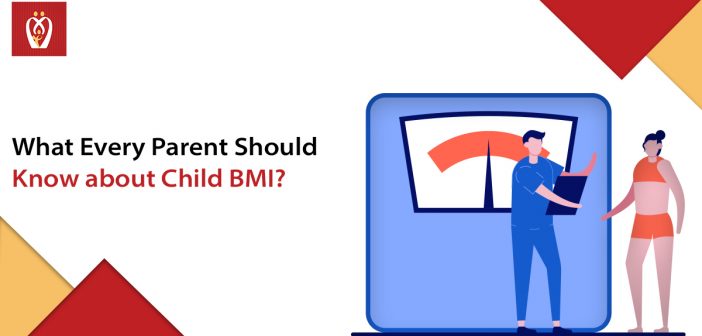Introduction
As a wise parent, you will always ensure that your child eats nutritiously. But, amid activities, you could forget to check if your child’s weight is within a healthy range. Your kid may be overweight even if you don’t see it since they do not appear obese. Eating patterns are established during the formative years, and evidence indicates that overweight or obese children may remain the same as they enter early childhood. This is why knowing your kids BMI percentile is always important. A BMI percentile estimate is just as significant as any other type of health exam. It would be valuable information for most future health checks as well.

Child BMI
What is a Child BMI?
The BMI calculates how much body fat the child has. It is determined by height and weight. However, height and weight alone are not as precise for children as they are for adults.
Why?
Because the percentages of body fat in children fluctuate as they develop. Their BMIs differ depending on their age and gender. As a result, when healthcare experts discuss a child’s BMI, you won’t generally hear a single figure, such as 25, but rather a percentile, such as 75th. They compare a child’s BMI to that of other children their age and gender. Weight categories are according to BMI percentiles:
- Underweight: less than the fifth percentile
- Healthy weight ranges from the 5th to the 85th percentile.
- Overweight ranges from the 85th to the 95th percentile.
- Obesity: 95th or higher percentile
As screening techniques, the BMI percentile and growth chart are utilised. Your doctor may need to do additional tests as children develop at different rates to determine whether or not your kid is overweight or obese. Consult your doctor and a dietitian if you suspect your child is overweight.
Causes that contribute to kids BMI
Children and adolescents have no say over the setting in which they live or the food they consume. Furthermore, they have limited awareness of the long-term consequences of their actions. WHO recommended two variables contributing to childhood overweight and obesity in conjunction with social and economic development and policies in education, agriculture, transportation, urban planning, environment, food processing, distribution, and marketing.
- A global dietary movement towards more energy-dense foods rich in fat and sugar but deficient in vitamins, minerals, and other beneficial micronutrients;
- Physical activity levels are decreasing due to the more passive character of many types of recreation, changing modes of transportation, and rising urbanisation.
When should parents become concerned about their child’s weight?
We do not begin calculating BMIs for children until they are two years old. Examining the growth curve and trend, on the other hand, is sometimes more significant than merely a number. As a parent, one would be concerned if their child’s healthcare practitioner informs them that their child’s weight has been continuously raised and that dietary and/or lifestyle adjustments are advised.
Is BMI the right index to understand a child’s weight?
BMI for children is usually regarded as a good indicator of body fat by experts, at least among larger children. However, in other circumstances, it may be deceptive. Athletic children, in particular, may be classified as overweight even though they are muscular. The BMI of your child is essential, but it is only one piece of the puzzle.
If your child’s BMI percentile reveals that they are not in the healthy range, they require a thorough weight and lifestyle examination with a paediatrician. Children’s BMI report cards are effective in studies conducted in the United Kingdom. According to one research, after receiving the report, almost half of the parents with overweight children made some healthy lifestyle adjustments.
Some school districts have begun to assess all children’s BMIs in the classroom. The school then sends a report card home to notify parents of any weight concerns. Although some parents object to schools receiving statistics on their children’s BMI, experts stress the goal is not to humiliate anybody. Instead, its purpose is to inform parents of a significant health condition.
Some tips for parents to keep a check on their kids BMI
Experts urge that kids of all ages and weight categories follow these healthy rules to maintain a healthy weight. Every day, it’s simple to recall them as 5-2-1-0.
- 5: Each member of your household needs five servings of vegetables and fruits. Even if the youngsters don’t eat them, keep serving them. They are more inclined to try a dish if they see it often. So every snack or meal should include a fruit or vegetable.
- 2: Limit your TV viewing to no more than 2 hours each day. Family members who use other “screens,” such as video games or laptops, get less TV time. Also, remove the television from all bedrooms.
- 1: Engage in one hour of physical activity. Add up the amount of time each family member spends on the go; it should be 60 minutes or more for each individual. Begin with a tiny amount and gradually increase as needed. The aim is for all of those minutes to be at least moderately active, with perspiration occurring after around 10 minutes.
- 0: That’s how many sugar-sweetened beverages you should have a day. Sugar can be found in juice drinks like lemonade and fruit punch and sodas, tea, and coffee. Instead, drink water or low-fat milk.
How Nurturey helps parents in understanding their child’s overall growth?
Nurturey’s PinkBook is the smartest digital upgrade for the NHS paper red book. It helps track your child’s growth and development using growth charts, Z scores, and BMI, and get health advice from the NHS. Nurturey’s PinkBook offers trustworthy NHS advice based on growing health requirements. In addition, parents receive current and useful information in the form of articles and videos straight from the NHS, assisting them in tracking their child’s health.
Conclusion
Parents are encouraged to take the lead in living and encouraging a healthy lifestyle. Parents, being the individuals who have the most direct contact with their children, are accountable for assisting their children in losing weight. The fundamental issue is not how children may lose weight but how parents can notice and take proper actions to assist their overweight children in losing weight.







